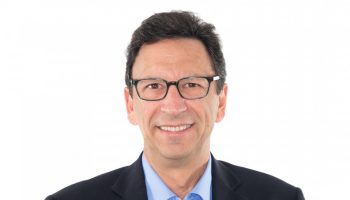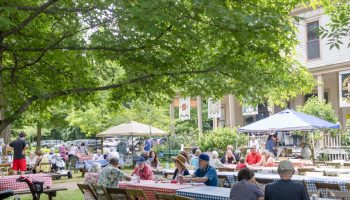One focal area of my job is to work toward a more accessible Chautauqua. I think of accessibility broadly, including physical, programmatic and technological accessibility. Chautauqua Institution has made a public commitment to do an accessibility audit in its Inclusion, Diversity, Equity and Accessibility (IDEA) Strategic Plan (available at idea.chq.org). To be clear: We believe we are compliant with the law, but our shared values call us to do more.
Last week, I had a profound experience with Chautauqua’s accessibility. I was invited by Chautauquan Terrie Vaile Hauck to accompany her on a loaned mobility scooter. I am writing about this experience with her permission. On our ride, as we navigated curbs, uneven pavements, narrow bathrooms and lobbies, it became even more clear to me that we have a lot of work to do. I made long lists of high-priority items. Some of these are quick and easy fixes, such as moving garbage cans closer to the pavement. Others, like installing an elevator in Hultquist, require time and significant resources (in this case, $350,000).
The most profound part of my ride-along experience was the frustration I felt when I could not access buildings because there was no automatic door opener button or ramp to make it accessible. Well, it wasn’t exactly just frustration. I also felt sad because I felt like I didn’t matter. In a community that values the dignity and contributions of all people, no Chautauquan should ever have to feel like that. As Terrie put it, “When you are in a wheelchair or scooter, sometimes you just become invisible to the rest of the world.” While a two-hour scooter ride doesn’t even scratch the surface of understanding the full experience of people who have mobility challenges, it did provide me with some empathy and insight. Thank you, Terrie, for challenging and educating me.
You may have already noticed some expanded accessibility offerings at the Institution. In addition to assistive listening devices, we are now also offering braille transcription services for Chautauquans who are blind or have impaired vision. Braille menus are available in all Institution operated food establishments. There is a new landing spot on Children’s Beach for folks to park their scooters and wheelchairs. The Tuesday Bestor Fresh Market is also now set up so that all tables are lined up right next to Pratt’s paved surface. Our main gate parking lot has new ADA-compliant parking spots. The upcoming food festival will have multiple entry points for mobility devices. The list goes on. And yet, there is much more to do.
I had previously invited an accessibility expert to be on our grounds during Week Six and help with these efforts. Unfortunately, she had to cancel because of a medical issue. Nonetheless, I plan to host two public listening sessions on accessibility this week at the Jessica Trapasso Memorial Pavilion at the Children’s School (an accessible location) from 4 to 5 p.m. on Monday and from 12:30 to 1:30 p.m. on Friday. If you are unable to make it, please feel free to send comments to accessibility@chq.org.
I am of the firm belief that the longer you come to Chautauqua, the longer you live. Chautauqua is a place where we can rejuvenate our minds, bodies and spirits. If we become more accessible, then perhaps we will create better conditions for Chautauquans to continue to come to these sacred grounds for longer into their lives.
The Institution has done significant work on accessibility already. Each year, we do a number of capital improvement projects around accessibility. The number of buildings on our grounds that were constructed after the passing of the ADA can be counted on one hand. Our grounds are historical, and the list of accessibility enhancement projects is long. If you would be interested in discussing how you could enhance or accelerate our efforts in this area, please call my colleagues in the Advancement Office at 716-357-6404, or email accessibility@chq.org.
Amit Taneja
Senior Vice President & Chief IDEA Officer





